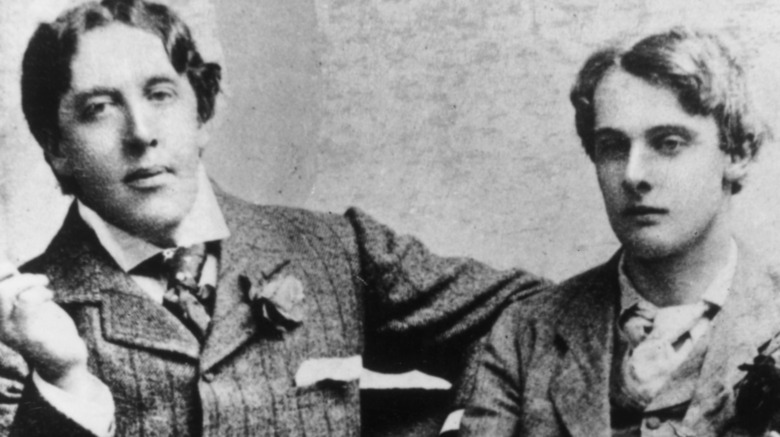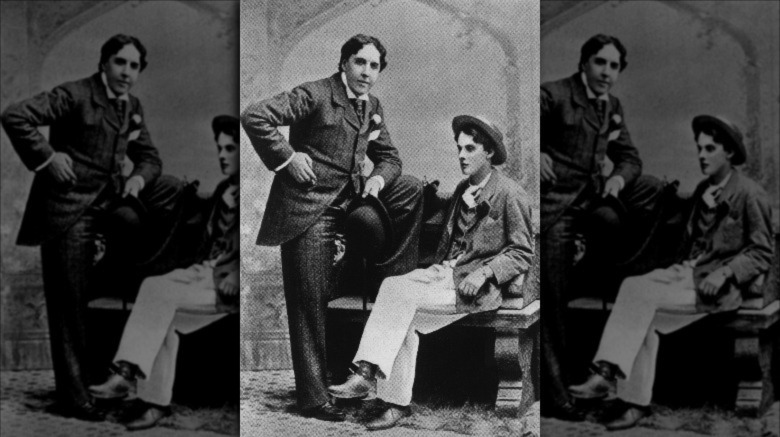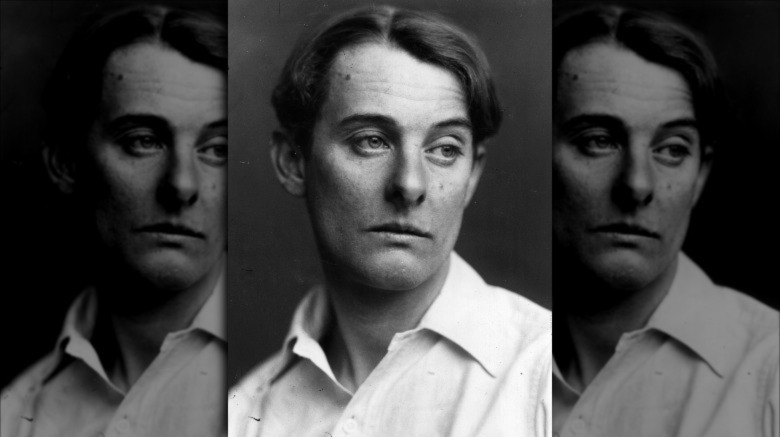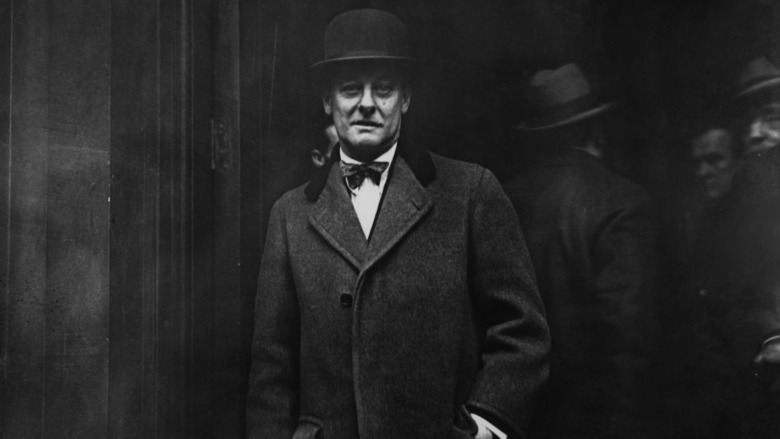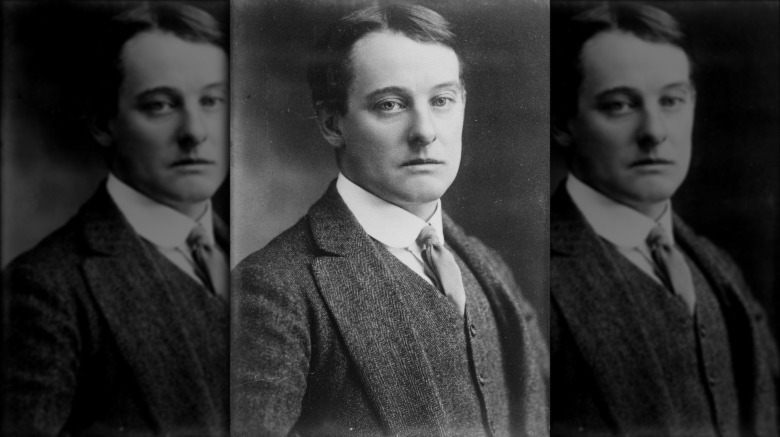Lord Alfred Douglas: The Man Who Destroyed Oscar Wilde
More than 120 years ago, Oscar Wilde (above, left) was one of the most famous men on the planet. Known for his incredible literary talent, his sense of style and design, and his quick, razor-sharp wit, Wilde was one of the original celebrities in the modern sense of the word. Wilde survived plenty of tragedy in his life, from the loss of his beloved sister Isola when he was just 12 years old, according to the Through the Eye of a Pegasus blog, and the loss of his first love, Florence Balcombe, to rival author Bram Stoker ("Dracula") (per The Paris Review).
But something really changed for Wilde when he met Lord Alfred Douglas (above, right), known as "Bosie," in 1891. Bosie and Wilde quickly became lovers, and Bosie introduced Wilde to a world of gay prostitutes and nonstop parties. Bosie's father, the Marquess of Queensberry, was a deeply conservative and extremely angry man who came to blame and despise Wilde for the rumors swirling about his son. When he publicly accused Wilde of being a homosexual — illegal at that time in England — Wilde chose to fight the charges instead of fleeing to friendlier France, reports History.com.
The trial and his conviction for "gross indecency" ruined Wilde's life both personally and professionally. He was sent to prison from 1895 to 1897, and emerged a broken man. He never recovered and died a few years later, alone and in poverty. And it was all because of Lord Alfred Douglas: The man who destroyed Oscar Wilde.
He ruined Oscar Wilde
As History.com tells us, prior to meeting Lord Alfred Douglas, Oscar Wilde kept his homosexuality a secret, and seemed initially happy in his marriage to Constance Lloyd. He was a popular and well-respected writer and personality. Wilde did have homosexual affairs before he met the man he called "Bosie," but as The Guardian notes, Lloyd seemed unaware of them.
Wilde's affair with Bosie changed everything. Besides introducing Wilde to the underground world of gay prostitutes, the two engaged in a loud and impossible-to-ignore gay relationship that soon had tongues wagging. When Bosie's powerful and deeply conservative father the Marquess of Queensberry, lost patience, he went to Wilde's club and left a card for him that read, "For Oscar Wilde, posing somdomite [sic]," essentially outing Wilde for all to see at a time when being gay was very dangerous.
Wilde still had options. He could have fled and waited for the storm to blow over, but Bosie urged him to go on the offensive, and so Wilde sued the Marquess for libel. That was a huge mistake, as it forced the Marquess to publicly prove his accusations — which was pretty easy because, as The Guardian relates, Bosie had left incriminating letters in the pockets of suits he'd given Wilde, and because Bosie refused to testify in Wilde's defense. In short, Bosie got Wilde into his mess, made it worse, and then did nothing to help.
He betrayed Wilde — twice
When Wilde was found guilty of "gross indecency," a law commonly used in England to prosecute and jail homosexuals (as The Guardian tells us, it remained on the books and used for just that purpose until 1967) — his life was essentially ruined. He was packed off to jail for two years, his reputation was in tatters, and his wife was understandably shocked at the stories of his behavior that were shared at the trial.
But what might have been the worst part of it for Wilde was the fact that his lover had betrayed him. As The Guardian notes, Lord Alfred failed to make an appearance at Wilde's trial to defend him, and generally kept his distance. Famous Trials notes that testimony from Douglas very likely would not have saved Wilde, but the way Douglas abandoned him cut Wilde deeply. As the encyclopedia Britannica reports, Wilde composed his last major literary work, the searing love letter-cum-revenge note "De Profundis" ("Out of the Depths") during his imprisonment. The letter is both the story of Wilde and Douglas' relationship and a merciless takedown of Douglas' character and behavior.
Bosie didn't see that letter for decades, however, and in an incredible twist, The Guardian reports the two men reunited after Wilde's release, living together in Naples. But when Douglas' family threatened to cut off his allowance if he remained with Wilde, he left. A few years later, Wilde died, alone and flat broke.
He was a huge racist
Lord Alfred Douglas was an extremely good-looking man when he was young, but his physical beauty hid a pretty terrible person. As the Irish Times notes, he's widely considered "incapable of redemption," a self-obsessed man who fought with just about everyone in his life, alienating his own family.
Worse, he spent most of his life after Oscar Wilde's death attacking Wilde and trying to ruin Wilde's reputation, apparently in revenge for his portrayal in Wilde's final masterwork, the searing letter to and about Douglas, "De Profundis" (posted at Project Gutenberg). Simply put, Douglas was a petty and selfish man.
He was also a virulent racist. As The Dabbler reports, he spent much of his adult life accusing Jews of various conspiracies. When he was editor of a magazine called Plain English, he filled it with anti-Jewish diatribes. When he linked Winston Churchill to a truly bizarre conspiracy theory involving Jewish speculators gaming the stock market, he was convicted of libel and sent to prison. There he seemed to finally realize how awful he was; The Guardian reports that he softened his attitude towards Wilde and even admitted some responsibility. It was too little, too late, however.
He wasted his talents
Wilde wasn't attracted to Douglas solely because he was a fine-looking man; Douglas was also a writer and poet of some renown. As The Critic Magazine notes, his work is almost completely forgotten today, although at one point his poetry was fairly well regarded.
As The Irish Times tells us, however, Douglas insisted on working in a peculiar and obscure form of poetry called Petrarchan Sonnets, which reflected his almost violent opposition to any hint of modernism. Working in such a narrow form while disdaining anything new happening in the literary world more or less doomed Douglas' work to obscurity. Another factor may have been the early success he enjoyed. As The Critic Magazine notes, his work was praised and warmly received when he was a young student, and enjoyed immediate celebrity and success. Even Douglas himself later lamented that he would have been better off if he'd been able to keep working on his writing instead of being thrust into a world of celebrity and privilege.
The Guardian says that he spent much of his later life wasting his writing talent on revenge, using poems and his role as editor for various magazines to attack anyone he saw as an enemy and to further his racist ideas about Jews and other ethnicities. Douglas was so dislikable, when he died in 1945, only two people attended his funeral.
